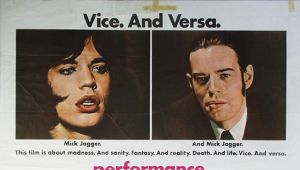In the mid-70’s, my dad, mum, brother and me used to go to Cornwall every year for our holiday. My dad’s favourite trick was to drive down country lanes at night with the headlights off with some very weird music blaring on the 8-Track. It used to scare the shit out of us. The reckless driving was bad enough, but it was the music that really gave me the creeps. The music was from the soundtrack of Performance – a film I didn’t see until I was fifteen. I taped it and watched it over and over with my brother and ever since it has remained my favourite film. Ever.
Made in 1968, but not released until 1970, it was originally conceived as a Swinging London style romp, but what directors Nic Roeg and Donald Cammell delivered up to Warner Bros was anything but. Along with the Rolling Stones’ disastrous free concert at Altamont, Performance sits there as a dark, violent coda to the 60’s. Music, free love, drugs and extreme violence.
Performance was the first film that either Roeg (Walkabout, Don’t Look Now, and The Man Who Fell To Earth) or Cammell (Demon Seed) had directed. It was also Jagger’s first film- the only real established name actor was James Fox , whose part was originally going to be played by Marlon Brando(!) Looking back now at the ground-breaking, machine-gun cut-up editing, (Jagger’s character makes an appearance before we are introduced to him), the avant-garde soundtrack, realistic depictions of violence, scenes of drug-taking and three in a bed romping, it’s impossible to imagine a major studio making a film like this today. Indeed, Performance very nearly didn’t make it to release.
There is a huge mythology surrounding Performance. Legend has it that more than one Warner exec threw up at the test screening. (Whether that is true or not, it’s great publicity). Warner Bros ordered a complete re-edit. They dubbed over the cockney accents, scared that an American audience wouldn’t understand – Donald Cammell : “One thing we hadn't anticipated was the language problem. In the gangster scenes, the south-London patois was spot on but a bit specialised even for other parts of London, let alone America. The studio people would sit at the screenings with strained expressions as though this was a Japanese movie with Czech subtitles”.
More…
Thankfully, recent re-issues have restored the original dialogue. The studio wanted to make more of the big name star (Jagger doesn’t appear till almost half-way through) and thought they were getting a Beatles-style musical jape. To prepare for his role, James Fox who was more used to playing upper-middle class, was sent to hang out with real-life villains John Bindon and Johnny Shannon and their gangster and boxing club mates in South London to prepare for the role. Both appear in the film, Bindon as a heavy and Shannon as gang boss Flowers.
James Fox: “Johnny Shannon was my minder. I was in on the social life of some pretty rough people. I spent hours listening to tapes of people like the Krays and the Richardsons. I met Ronnie Kray.”
The film took a heavy toll on some of its stars and others close to its making: Actual magic mushrooms and dope were used on set, Fox went over the edge and didn’t make another film for 10 years after Performance, spending his time as part of an evangelical Christian sect – “I was converted in December 1969. I was in absolute denial about the film and my part in it”. Michelle Breton disappeared and only resurfaced in the nineties, trying to clean-up in Afghanistan. Keith Richards sat parked up outside the house where the film was being shot for days, jealous that his girlfriend, Pallenberg, was inside romping with Jagger – his worst fears probably confirmed when he saw the final cut –out-takes of the threesomes involving Jagger, Pallenberg and Breton won an un-official award at an Amsterdam porn festival. Not surprisingly, Warner’s hated it and they mothballed it for two years. When it was finally released, the Rolling Stone review advised readers “not to watch it whilst tripping”.
There are layers on layers and it’s one of those films where you see something you hadn’t noticed before each time you watch it.
Performance is the story of Chas (James Fox), a jack-the lad foot-soldier in Harry Flowers’ London gang, or “associated group of companies”, whose job it is to put the frighteners on flash little twerps. Putting a bit of stick about. Although he is “an out of date boy, an old-fashioned boy”, the boy is a performer. He enjoys his work. After over stepping the mark by getting Mad Cyril to smash up Joey Maddocks’ betting shop and then killing Maddocks himself, Chas is forced to go on the run from Flowers’ gang and ends up hiding out in the crumbling Notting Hill mansion of jaded, faded, mojo-less reclusive pop star, Turner (Mick Jagger), who has “lost his demon”. There’s that great scene when Chas first turns up at Powis Square and clocks the Mars bars delivered to the doorstep together with the pints of milk – a nod to the arrest of Jagger and Marianne Faithful at Keith Richards’ country estate, Redlands. Turner, along with drug-fucked housemates Pherber (Anita Pallenberg) and Lucy (Michelle Breton), is fascinated by Chas, and although Chas is at first contemptuous of Turner’s way of life (“It’s a right pisshole, long hair, beatniks, free love, druggers”), he begins to open up after a night on the mushrooms with the threesome. Two very different worlds collide - Chas begins to influence Turner and Turner begins to influence Chas. Vice and versa, as the publicity posters for the film put it, until the two seem to merge in the film’s finale.
There are several recurring themes – Argentinian writer Jorge Luis Borge and his theory of “magic realism”, Magritte, Francis Bacon and Antonin Artaud . Artaud contended that imagination is reality and that theatre should affect the audience as much as possible. Artaud’s life was a constant struggle between insanity and creativity. “The only performance that makes it, that makes it all the way is the one that achieves madness” Turner tells Chas. Mergers and takeovers in both the business and physical sense are also threads that run throughout the film. There are layers on layers and it’s one of those films where you see something you hadn’t noticed before each time you watch it.
The dialogue is spot on and unlike films like “Snatch” or “Lock Stock...” it doesn’t stick out like a sore thumb.
All British gangster films owe Performance a huge debt – but what sets it apart is that it’s not just a one note, violent claret-fest and, as is now de rigueur, the soundtrack is integral to the experience. Randy Newman’s uncharacteristically heavy number in the opening, Ry Cooder brings the Delta Blues to W11, the godfathers of rap The Dead Poets, Merry Clayton and Buffy Sainte-Marie’s throbbing, acid-drenched freak-outs are central to the film and the scene where Turner morphs into Harry Flowers (“Memo From Turner”) could be lifted from the film to stand alone as the first ever music video, and the ghost of Robert Johnson also puts in an appearance
Surprisingly, Performance hasn’t dated and that’s down to its authenticity – Fox is totally believable as Chas and while there is a fair bit of overt violence, he has that aura of implied violence that proper hard men have about them, no doubt due to his coaching from Bindon and Shannon. The dialogue is spot on and unlike films like “Snatch” or “Lock Stock...” it doesn’t stick out like a sore thumb. So much so, that the film has become a favourite with more than a few bands and pops up in work by the likes of the Happy Mondays (almost the whole of “Bummed”), Big Audio Dynamite (E=MC2) and The Charlatans . Alan Moore also paid homage in his “League of Extraordinary Gentlemen”. You can also see the film’s influence on Tarantino and Guy Ritchie, in the way that they use music and on Scorsese – the combination of gritty, violent realism and cerebral anguish.
It’s the thinking-man’s gangster film.
I like that. Turn it up.



